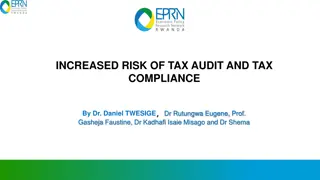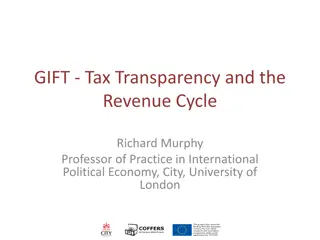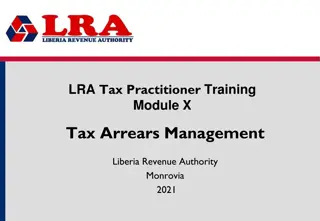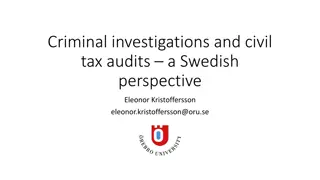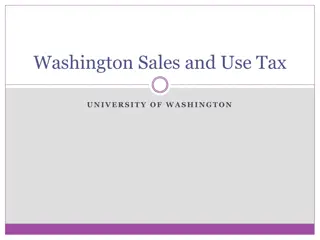Understanding Tax Morale and the Shadow Economy in Greece
Tax morale plays a crucial role in determining the size of the shadow economy in Greece. Factors such as unemployment, tax burden, and self-employment also influence the shadow economy. Tax compliance decisions are driven not only by enforcement but also by tax morale. Various determinants of tax morale include intrinsic motivation, reciprocity, peer effects, cultural factors, and information imperfections. Improving tax morale is essential for reducing shadow economic activities and enhancing tax compliance in Greece.
Uploaded on Sep 16, 2024 | 0 Views
Download Presentation

Please find below an Image/Link to download the presentation.
The content on the website is provided AS IS for your information and personal use only. It may not be sold, licensed, or shared on other websites without obtaining consent from the author. Download presentation by click this link. If you encounter any issues during the download, it is possible that the publisher has removed the file from their server.
E N D
Presentation Transcript
Tax Morale in Greece Aristidis Bitzenis and Vasileios Vlachos University of Macedonia, Thessaloniki, Greece
Shadow Economy: Definition It includes illegal activities involving the supply of legal goods and services (for example, smuggling) but excludes illegal activities involving the supply of illegal goods and services (for example, drugs). Definition from a study prepared on behalf of the European parliament by the European Commission.
Shadow Economy: Importance The exclusion of illegal activities is justified because on the one hand, the income derived thereof cannot be incorporated into formal economy, and, on the other hand, the inclusion of illegal activities would excessively extend the field of research to criminal policy matters.
Determinants of the Greek Shadow Economy Bitzenis, Vlachos and Schneider* find that tax morale is a key determinant of the Greek shadow economy. The other key determinants are unemployment, tax burden and self-employment. * forthcoming: Journal of Economic Issues.
Tax Compliance and Morale Tax morale is an important component of tax compliance decisions. In some cases as much as enforcement, which is the primary driver of compliance according to the literature. Luttmer and Singhal, Journal of Economic Perspectives, 2014.
Determinants of Tax Morale intrinsic motivation, which is the additional term in the utility function that increases in the amount of taxes that the individual decides to pay; reciprocity, in which an additional utility term for paying taxes depends on the individual s relationship to the state (perceptions about the fairness of the tax system and quality of public services); peer effects and social influences, in which the additional utility term for paying taxes depends on views or behaviours of other individuals; long-run cultural factors that may affect the willingness to pay taxes; information imperfections and deviations from utility maximization (i.e. cases where individuals misperceive the probability of being detected in evading taxes or may exhibit loss aversion). Luttmer and Singhal, Journal of Economic Perspectives, 2014.
Tax Morale in Greece: Reciprocity Tax morale in Greece has been explored either through studies on tax evasion or papers that focus on the shortcomings of the country s official institutions. Both highlight the reciprocity dimension of tax morale.
Low Tax Morale in Greece Low tax morale is influenced by distrust, both in government or state institutions (reciprocity) and in other taxpayers (peer effects, cultural factors, information imperfections)
Tax Morale in Greece: Clientelism and Rent-seeking The reciprocity dimension of tax morale in Greece has been affected greatly by the phenomena of clientelism and rent-seeking (corruption in the public sector). Government decisions are not depicted only in the size of fiscal deficits that increase the tax burden (like in the case of Greece), but also set the overall stage on which the economy performs, through regulations that shape labour and product markets and impact on the quality of official public institutions and administration.
Size of the Greek Shadow Economy: previous research Size of the Greek shadow economy (% of GDP) 26% in 2008 Study Method Schneider and Buehn (2012) provide estimates for the size of the shadow economy in 39 OECD countries (estimates for 1999-2010). MIMIC approach. (27.4% is the average value for 1999-2008) 26.5% in 2007 Schneider et al. (2010) and Buehn and Schneider (2012a) provide estimates for the size of the shadow economy in 162 countries (estimates for 1999-2007). MIMIC approach. (27.5% is the average value for 1999-2007) Dell Anno et al. (2007) provide estimates for the size of the shadow economy in France, Spain and Greece (estimates for 1968-2002). MIMIC approach. Approximately 28% in 2002 36.7% in 1997 (2001) provides estimates for the size of the shadow economy in Greece (estimates for 1967-1997). Currency demand approach. (30.1% is the average value for 1967-1997) Comparison of data from the Household Budget Survey with private consumption as registered in the National Accounts. . . (1995) provide estimates for the size of the shadow economy in Greece (estimates for 1982 and 1988). 27.6% in 1982 and 34.6% in 1988 18.9% in 1984 - (1991) provides estimates for the size of the shadow economy in Greece (estimates for 1970-1985). Currency demand approach. (11% is the average value for 1958-1988) 31.6% in 1988 . . (1990) provide estimates for the size of the shadow economy in Greece (estimates for 1958-1988). Currency demand approach. (26.6% is the average value for 1958-1988) Assuming for discrepancies on the macro level: i.e. accounting for underestimation of value-added activities. (1987) provides estimates for the size of the shadow economy in Greece (estimates for 1984). 28.6% in 1984
Size of the Greek Shadow Economy: our estimates Country/Year Bulgaria Romania Croatia Lithuania Estonia Latvia Cyprus Malta Poland Greece Slovenia Hungary Italy Portugal Spain Belgium 2003 35.9 33.6 32.3 32.0 30.7 30.4 28.7 26.7 27.7 28.2 26.7 25.0 26.1 22.2 22.2 21.4 2004 35.3 32.5 32.3 31.7 30.8 30.0 28.3 26.7 27.4 28.1 26.5 24.7 25.2 21.7 21.9 20.7 2005 34.4 32.2 31.5 31.1 30.2 29.5 28.1 26.9 27.1 27.6 26.0 24.5 24.4 21.2 21.3 20.1 2006 34.0 31.4 31.2 30.6 29.6 29.0 27.9 27.2 26.8 26.2 25.8 24.4 23.2 20.1 20.2 19.2 2007 32.7 30.2 30.4 29.7 29.5 27.5 26.5 26.4 26.0 25.1 24.7 23.7 22.3 19.2 19.3 18.3 2008 32.1 29.4 29.6 29.1 29.0 26.5 26.0 25.8 25.3 24.3 24.0 23.0 21.4 18.7 18.4 17.5 2009 32.5 29.4 30.1 29.6 29.6 27.1 26.5 25.9 25.9 25.0 24.6 23.5 22.0 19.5 19.5 17.8 2010 32.6 29.8 29.8 29.7 29.3 27.3 26.2 26.0 25.4 25.4 24.3 23.3 21.8 19.2 19.4 17.4 2011 32.3 29.6 29.5 29.0 28.6 26.5 26.0 25.8 25.0 24.3 24.1 22.8 21.2 19.4 19.2 17.1 Czech Republic Slovakia Sweden Denmark Finland Germany Ireland France 19.5 18.4 18.6 17.4 17.6 17.1 15.4 14.7 19.1 18.2 18.1 17.1 17.2 16.1 15.2 14.3 18.5 17.6 17.5 16.5 16.6 15.4 14.8 13.8 18.1 17.3 16.2 15.4 15.3 15.0 13.4 12.4 17.0 16.8 15.6 14.8 14.5 14.7 12.7 11.8 16.6 16.0 14.9 13.9 13.8 14.2 12.2 11.1 16.9 16.8 15.4 14.3 14.2 14.6 13.1 11.6 16.7 16.4 15.0 14.0 14.0 13.9 13.0 11.3 16.4 16.0 14.7 13.8 13.7 13.7 12.8 11.0 United Kingdom Netherlands Luxembourg Austria EU28 unweighted average 12.2 12.7 9.8 10.8 12.3 12.5 9.8 11.0 12.0 12.0 9.9 10.3 11.1 10.9 10.0 9.7 10.6 10.1 9.4 9.4 10.1 9.6 8.5 8.1 10.9 10.2 8.8 8.5 10.7 10.0 8.4 8.2 10.5 9.8 8.2 7.9 22.6 22.3 21.8 21.1 20.3 19.6 20.1 19.9 19.6
Tax Morale vis--vis Tax Burden Two out of four key determinants of Greece s shadow economy have undergone great changes due to the crisis: 1. The tax burden increases as Greece s financial position deteriorates. 2. Unemployment has exploded. Assuming that unemployment s importance increased due to the substitution effect, has tax burden become more important than tax morale, due to the crisis?
Tax Morale vis--vis Tax Burden: Fact 1 Income tax rate Although the tax burden in terms of the average wage-income tax rate has increased, it still remains below the respective average OECD rate. However, wage earners cannot conceal part of their income. Over 85% of income tax revenue in Greece was and still is from physical entities.
Tax Morale vis--vis Tax Burden: Fact 2 Employers/ees contributions Tax wedges in Greece (up to 100% of average tax wedges) are lower from the respective wedges of eurozone s core and peripheral economies (France, Germany, Italy, Portugal and Spain).
Tax Morale vis--vis Tax Burden: Fact 3 Business taxes Business total tax rate as a percentage of commercial profits in Greece is higher than the EU average. However, business tax burden per se is not correlated to the size of the shadow economy. Countries with bigger shadow economies, such as Bulgaria and Cyprus, and countries with smaller shadow economies, such as Portugal, have considerably lower total tax rates as a percentage of commercial profits.
Tax Morale vis--vis Tax Burden: Fact 4 Value Added Tax rate The standard VAT rate in Greece is well above the OECD average respective rate and above all standard VAT rates across the OECD (except from Finland and Hungary). VAT rate per se may be a motive for Greek taxpayers to engage in VAT evasion.
Tax Morale vis--vis Tax Burden: Fact 5 Sense of unfairness Over 85% of income tax revenue in Greece was and still is from physical entities. Tax amnesties. Preferential tax treatments. Poor performance in tax audits and collection.
Enforcement or motivation? The definition of the shadow economy reveals what the policy aim should be: Transferring part of it to the formal/official economy and not simply terminating shadow economic activities. Considerations: Slippery slope framework: motivation (tax morale) is highly important for achieving such a transfer. Shadow economy also provides succor for the economic crisis.
Conclusion: Slippery slope framework and the key determinants of the Greek shadow economy Unemployment (shadow economic activities should not be terminated due to the crisis). Self-employment (enforcement in terms of frequent audits).
Conclusion: Slippery slope framework and the key determinants of the Greek shadow economy Tax morale: reciprocity will improve directly through fighting rent-seeking and clientelism (enforcement), the negative effect of other tax morale determinants will diminish through improvements in other key shadow economy determinants. Tax burden (better allocation).
Conclusion: An endeavor that requires time Although a transfer of the shadow to the official economy will provide economic succor amid the crisis, the time required for institutional change (tax morale) indicates that results will occur in the medium-long term.




![Town of [Town Name] Real Estate Tax Rates and FY 2024 Budget Summary](/thumb/62211/town-of-town-name-real-estate-tax-rates-and-fy-2024-budget-summary.jpg)
